Let us introduce you to our extensive research and reviews on project management software. Search or skim our list to quickly understand each software’s top features, pros, cons and pricing.
Or maybe you’re ready to build your ideal project workflows and portfolios right away on our flexible Work OS?
What is project management software?
Project management software includes all the platforms and tools that help managers and teams plan, coordinate, and execute every aspect of project planning.
In short, it is made up of tools and apps designed to help you work more efficiently.
There’s an incredibly wide variety of project management software— from personal to-do lists to comprehensive “all-in-one” solutions —that facilitates the production of work for businesses of any shape and size.
Read how to successfully manage projects in our complete project management guide.
What features should a good project management software include?
One of the main benefits of good project management software is that it should serve as an all-in-one tool and provides these features:
1. Seamless team collaboration and shared task lists
A project management software should have features that enable team members to communicate and collaborate effectively such as document sharing, communication in real-time (notes, comments, files) and activity feeds.
2. Gantt charts and timeline visualization
Gantt charts and timeline visualization help in planning and tracking project progress, allowing you to identify bottlenecks and make necessary adjustments.
3. Resource Management
Ensure that the right people are assigned to the right task at the right time by looking out for features such as resource planning and tracking.
4. Reporting and Analytics
Integrated analytics tools can help you gain insights into project progress, team performance, cost and other relevant metrics to make data-driven decisions.
How to choose project management software?
When choosing project management software for your team, there are several factors to consider. Some common factors that teams and companies focus on are ease-of-use, scalability, reporting, security, and pricing. The rest depends on your unique team needs and may require you to try out different systems before finding one your team loves.
Our list of top 15 project management software
Given the need for project management software with a vast range of features and different pricing, it makes sense to start with an overview table for the top project management software, tools and apps. The software that are listed the highest, make the best option in terms of fulfilling our criteria when we looked at project management capabilities, reporting, support, security, and price,
| Software name | Best for | Best feature | Price starting from |
|---|---|---|---|
| 1. monday work management | Managing multiple projects simoultaneously | Many project views | $9 per user/month |
| 2. Asana | Tracking project progress | Multiple project views | $10.99 per user/month |
| 3. Trello | Visualizing workflows | Kanban view | $5 per user/month |
| 4. Smartsheet | Managing processes at scale | Process automation | $7 per user/month |
| 5. Jira | Managing dev projects | Issue tracking | $5 per user/month |
| 6. Wrike | Visual project planning | Gantt chart | $9.80 per user/month |
| 7. Basecamp | Tracking project progress | Unique Hill chart feature | $15 per user/month |
| 8. Clickup | Managing multiple tasks | Automatic progress-tracking | $7 per user/month |
| 9. Zoho Projects | Automate routine tasks | Blueprints for processes | $4 per user/month |
| 10. Nifty | Increasing team productivity | Task breakdown | $3.90 per user/month |
| 11. Todoist | Managing tasks | Add tasks using natural language | $4 per user/month |
| 12. Miro | Team Collaboration | Mind mapping | $8 per user/month |
| 13. Hive | Overseeing workload | Resource planning | $5 per user/month |
| 14. Notion | Managing project documentation | Note-taking capabilities | $8 per user/month |
| 15. Airtable | Upgrading from spreadsheets | Automations | $20 per user/month |
1. monday.com
monday.com is a work management system designed to help teams work without limits when it comes to project and task management. monday work management offers a user-friendly and intuitive interface with a range of customizable features that cater to the specific collaboration and communication needs of any team across industries.
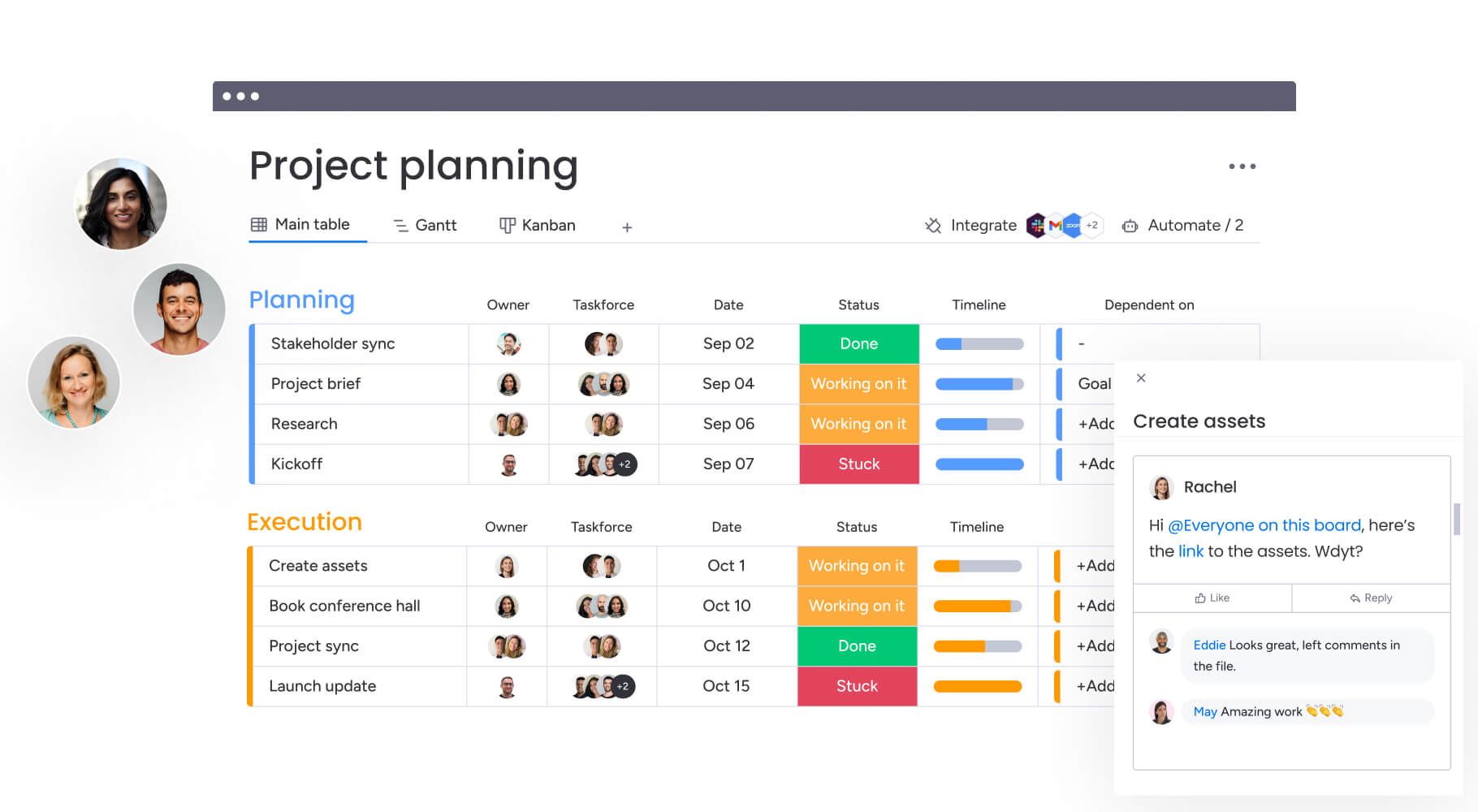
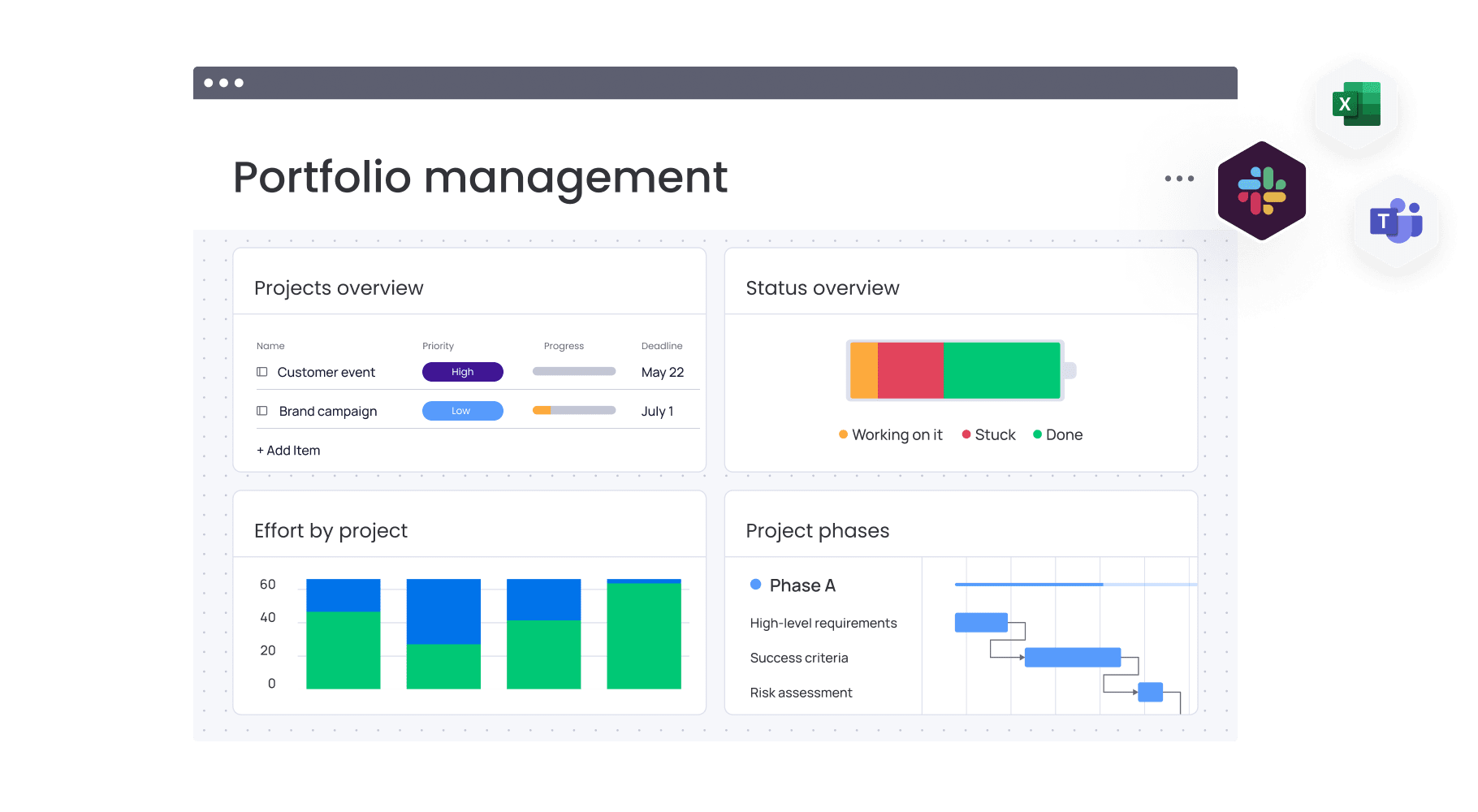
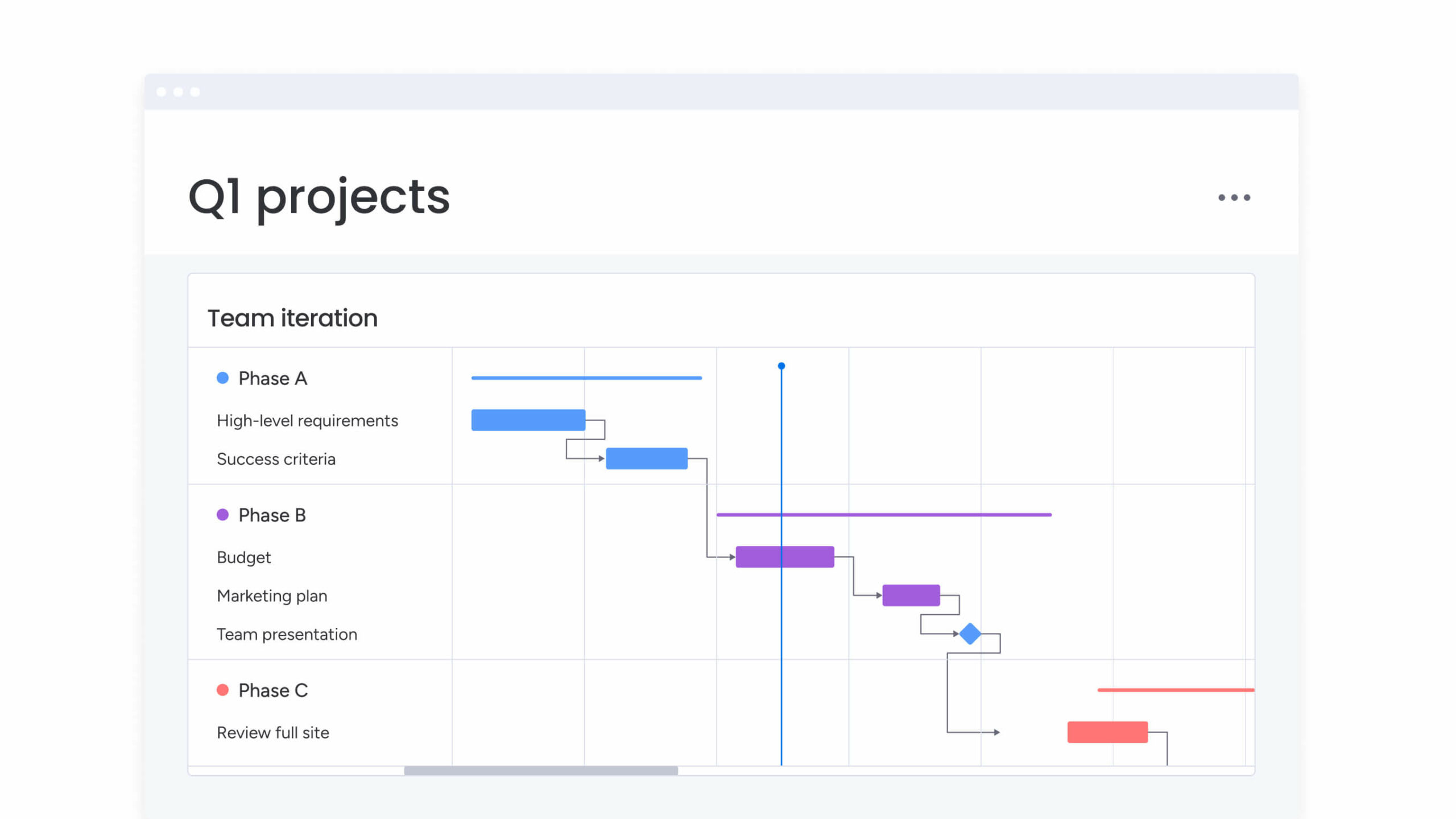
Top features of monday.com
1. Project portfolio management
With the new project portfolio solution you can and get a birds-eye view on project progress of multiple projects.
2. Gantt charts
monday.com Gantt chart view allows you to create task dependencies and update task owners and due dates with ease.
3. Workflow builder
Choose from 100s of pre-made automation recipes or create your own custom ones to create workflows that sync integrations, people, and more.
Pros:
- Best-in-class customer support
- AI features
- Excellent mobile app for on-the-go project management
Cons:
- You might need to upgrade plans to get certain features
- No viewing options for non-users
monday work management pricing
Free: $0 for up to 2 users
Basic: $9/month/user with annual billing
Standard: $12/month/user with annual billing
Pro: $19/month/user with annual billing
Enterprise: Contact sales for pricing
More details on monday.com pricing here.
Why customers love monday.com
- Trustradius: 8.5 out of 10
Voted in 2023: best features set, relationship and value - G2: 4.7 out of 5
Voted in 2023: Leader in over 18 categories - Capterra: 4.6 out of 5
Shortlisted in 2023 in over 8 software categories
2. Asana
Asana is a popular project management tool designed to help teams collaborate and manage their tasks and projects more efficiently. Asana has gained a reputation as a reliable and easy-to-use tool for project management, and it is used by many businesses and organizations around the world.
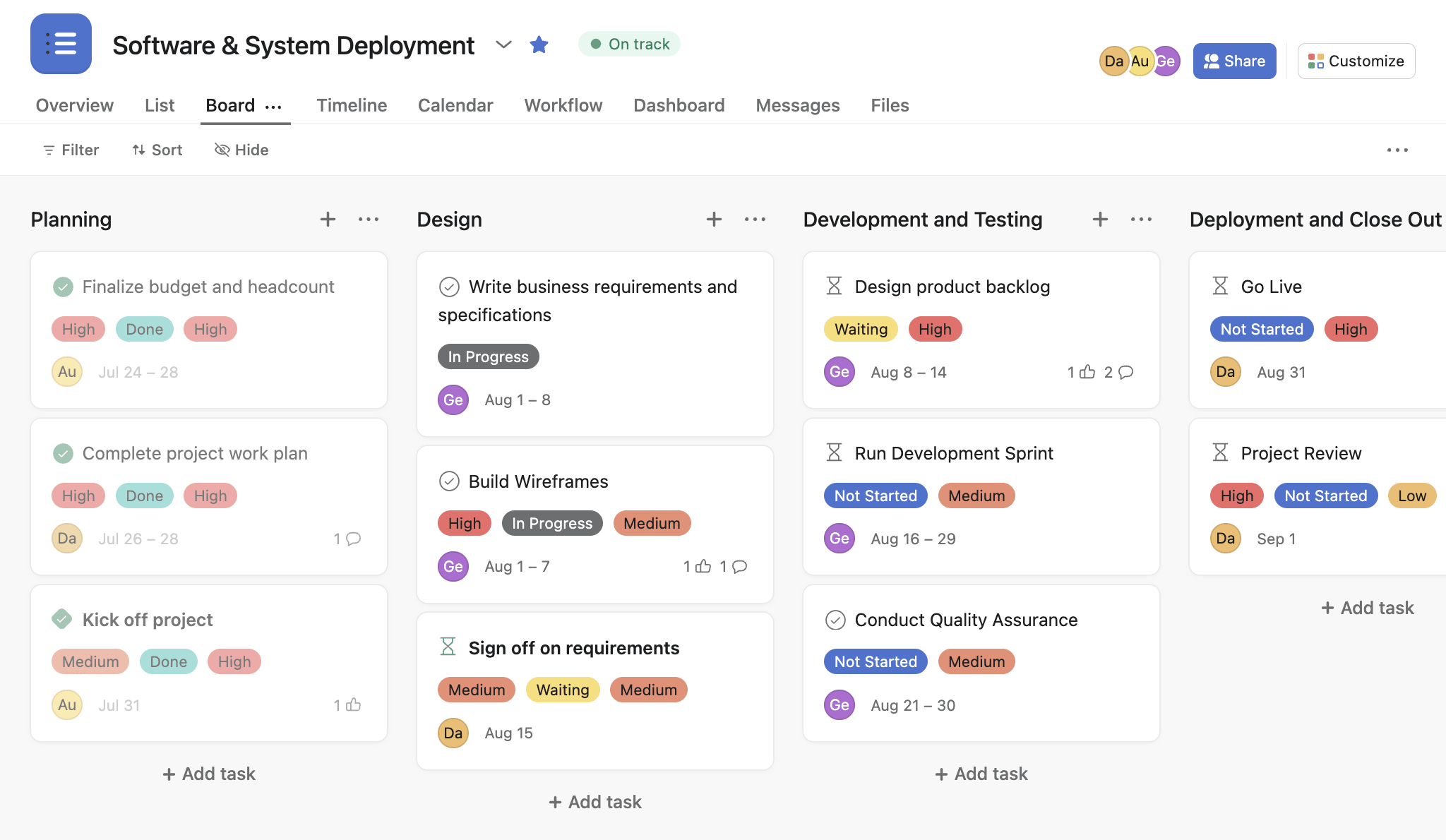
Asana top features
1. Calendar view:
See all of your most important deadlines in one dedicated calendar.
2. Agile framework:
The software has a time boxed, iterative approach for product development workflows.
3. Change requests and case management:
Enable efficient tracking of customer requests with priority and timeline.
Pros:
- Manage all project documentation in one place.
- Asana also uses drag-and-drop for ease of use.
Cons:
- Asana may not be suited for larger teams or those who don’t prefer an agile approach.
- Limited customization options, such as notifications.
Asana pricing: $10.99/user/month with annual plan. Free plan available. More details on Asana pricing and review here.
Comparison: explore this Asana alternative.
3. Trello
Trello is a web-based project management tool that uses a board-based approach to help individuals and teams organize their tasks and projects. It is a popular and user-friendly tool that allows users to easily track their progress, collaborate with team members, and visualize their workflow simply and intuitively.
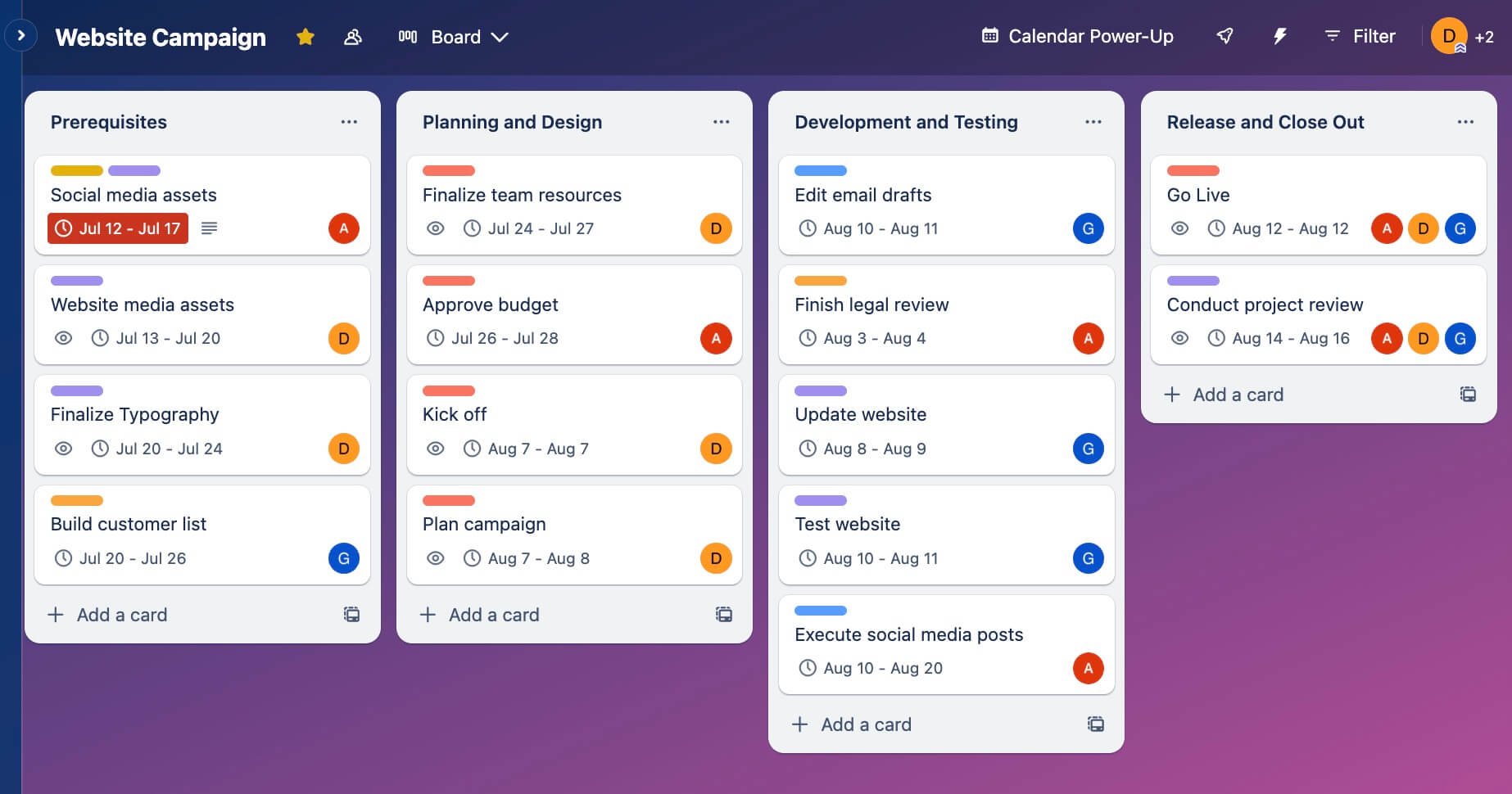
Trello top features
1. Kanban cards:
Trello uses Kanban cards to help you track task and project progress.
2. Checklists:
Break down cards into smaller tasks by adding checklists to them.
3. Activity feed:
See all recent changes and activity on your project board, like card updates and comments.
Pros:
- It’s a great tool for teams who prefer iterations and Kanban.
- Teams can communicate in real time.
Cons:
- Trello doesn’t offer project management software classics like Gantt charts or resource management features.
- Kanban cards might not be ideal for larger, complex, and unpredictable projects.
Trello Pricing: $5/user/month with annual plan. Free plan available. More details on Trello pricing and review here.
Comparison: explore these Trello alternatives
4. Smartsheet
Smartsheet is a software as a service platform to plan, capture, track, automate, and report on work at scale. It offers a rich set of views, reports, workflows, and dashboards to adapt according to business needs.
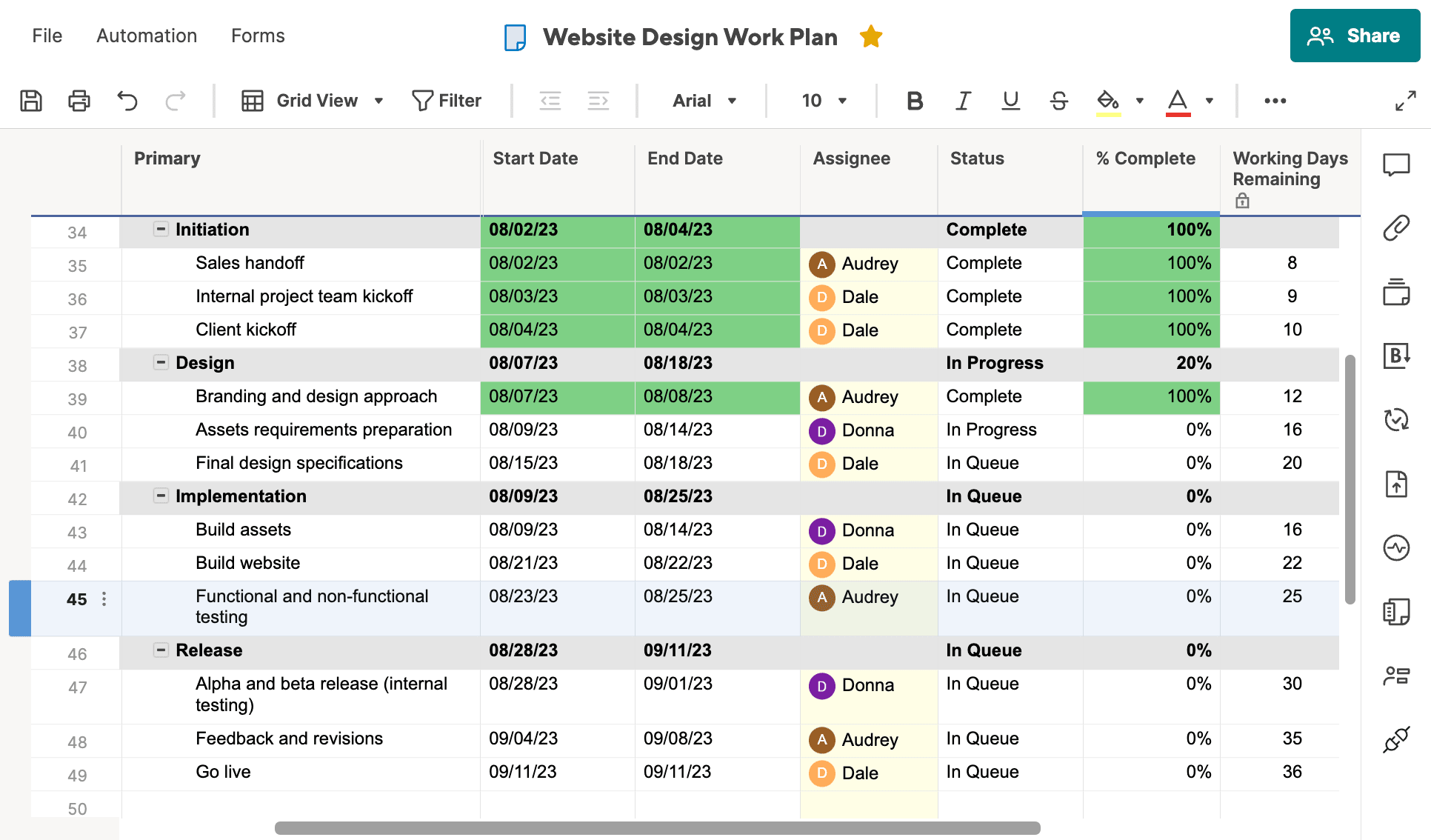
Smartsheet top features
1. Dynamic gantt charts:
Smartsheet’s Gantt chart view allows users to visualize project timelines and dependencies, with the ability to easily adjust schedules and assignments.
2. Customizable forms:
Smartsheet’s customizable forms feature enables users to gather and organize data, such as customer feedback or project requests.
3. Data integration:
It seamlessly integrates with a wide range of third-party tools, such as Salesforce, Jira, and Microsoft Office.
Pros:
- Versatile platform:Smartsheet can be used for a wide range of tasks and projects, making it a valuable tool for businesses of all sizes and industries.
- Real-time collaboration:Smartsheet’s collaborative features allow team members to work together in real-time, improving communication and productivity.
Cons:
- Reporting:The reporting functionality could be improved, with limited options for creating custom reports.
- Missed add-ons:It requires add-ons for time tracking and resource management.
Smartsheet pricing: $7/user/month with annual plan. Free plan available. More details on Smartsheet pricing and review here.
5. Jira
Jira Software is a server-based customizable workflow management solution that organizes tasks and projects into a centralized platform. It provides businesses with an infrastructure for automated processes and increased productivity.
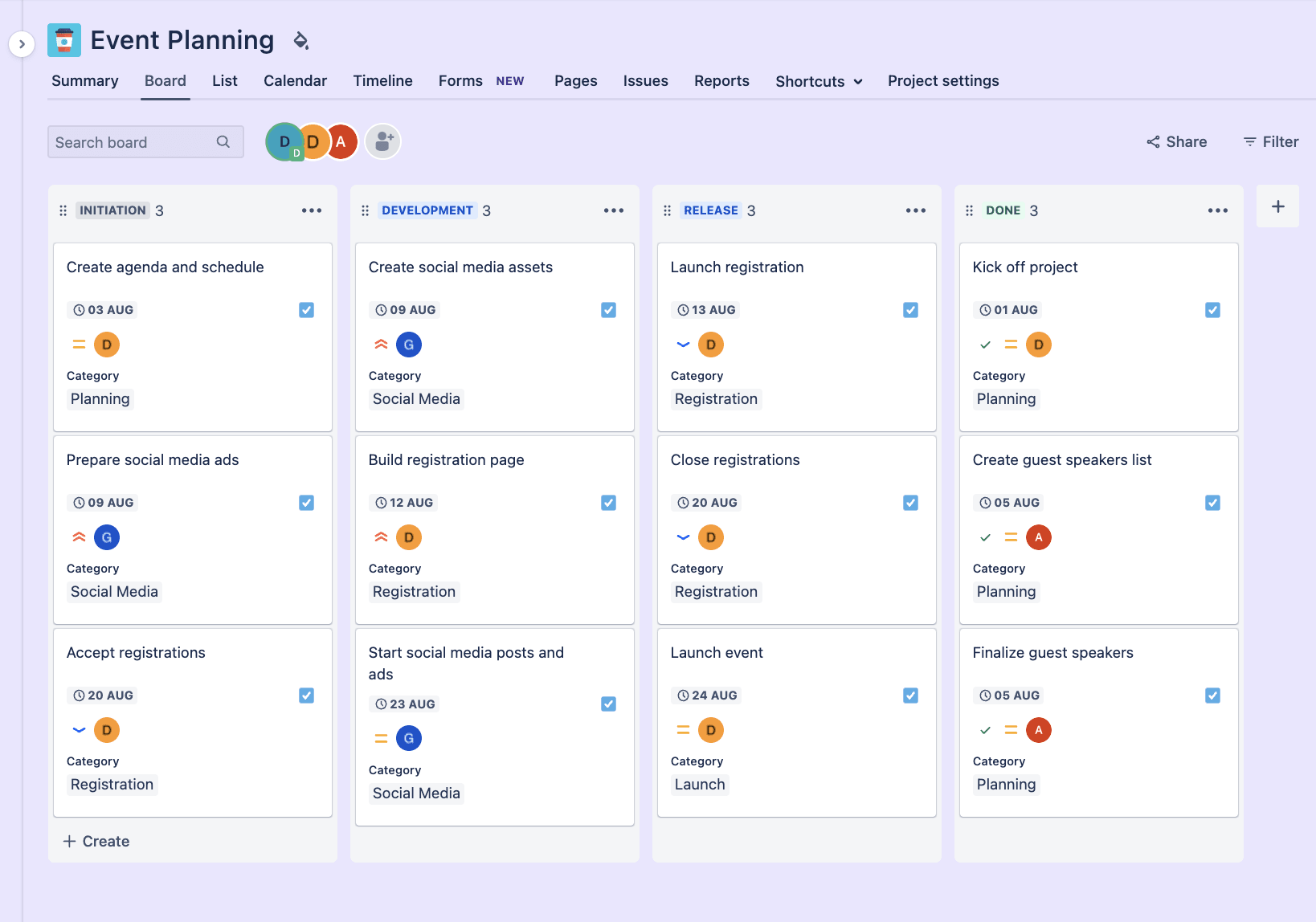
Jira top features
1. Configuration:
This software is known to be highly configurable and customizable with granular control over security, privacy, and workflows.
2. Timeline view:
Backed by Gantt Chart, timeline view lets users map dependencies and plans work effectively.
3. Cross-project syncing:
You can mark tasks as a duplicate across projects to keep track of work between teams.
Pros:
- Subtasks:Break up a task into smaller parts, or show additional steps to complete an overall task.
- Due dates: Track important dates and time so everyone’s working off the same deadline—no matter their time zone.
Cons:
- Limited pre-made templates:Only 23 pre-made templates are available, which can be a challenge.
- Lack of integrations:Jira Core lacks integrations with many other productivity and task management sharing tools and apps.
Jira pricing: $5/user/month with annual plan. Free plan available. More details on Jira review and pricing here.
Comparison: explore these Jira alternatives
6. Wrike
Wrike is a cloud-based project management software designed to help teams streamline their workflows and collaborate more effectively. It was founded in 2006 by Andrew Filev and has since grown into a popular tool used by businesses of all sizes to manage projects from start to finish.
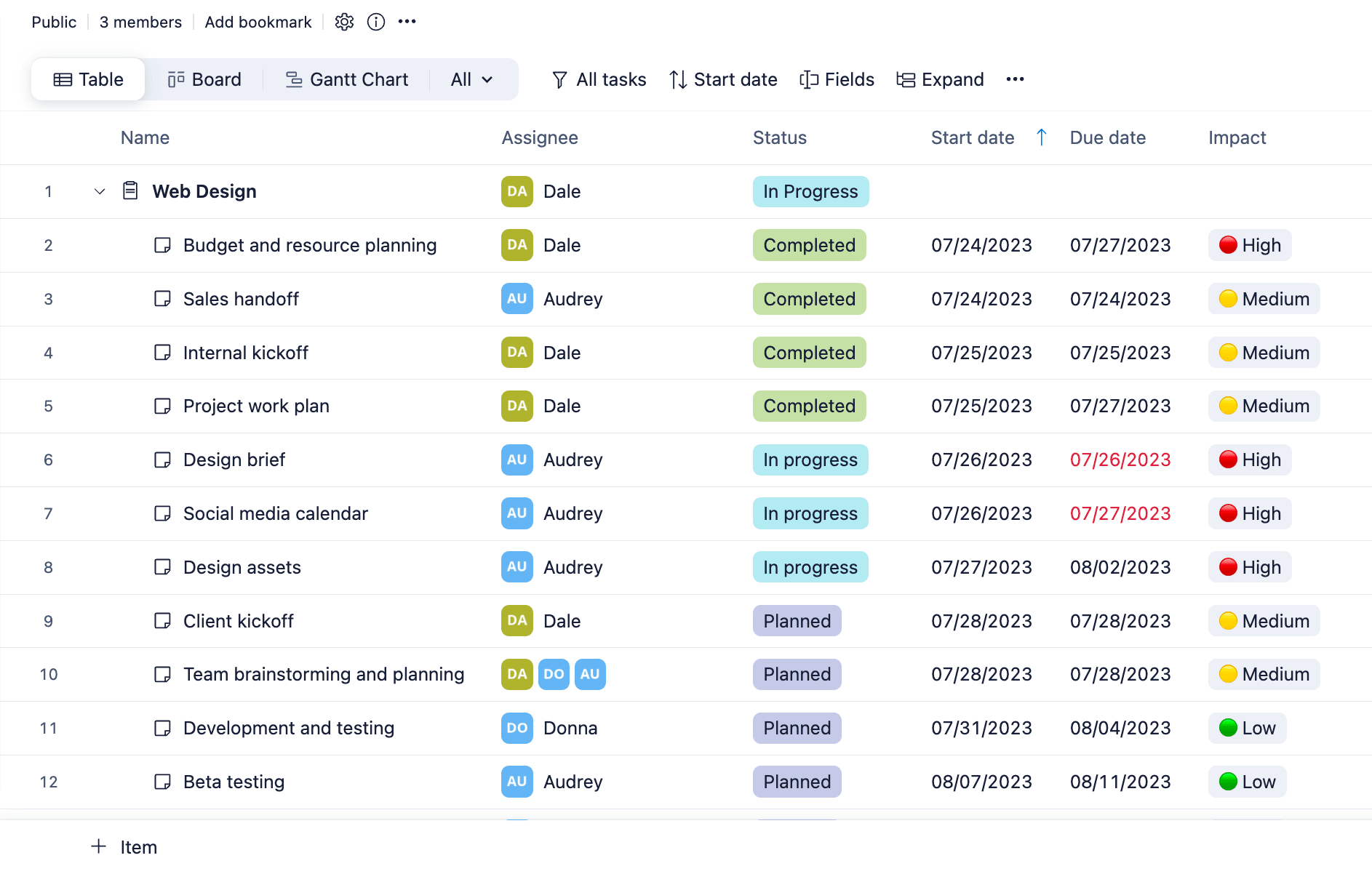
Wrike top features
1. Integrations:
Wrike integrates with project management must-haves like Google Drive, Zendesk, WordPress, Zapier, Slack, and more.
2. Wrike Approvals:
The software has a dedicated feature to make the project review process smoother.
3. Budget & expense management:
Customize currency preferences and create default hourly rates and job roles for projects.
Pros:
- Create dashboards for visual and accurate stakeholder communications.
- There is a high level of customization possibilities.
Cons:
- Some users had hoped for more triggers and actions available under their automation engine.
- You have to pay extra for advanced reporting.
Wrike pricing: $9.80/user/month with annual plan. Free plan available. More details about Wrike pricing and review here.
7. Basecamp
Basecamp is a project management tool that helps teams to stay organized, collaborate efficiently, and complete projects on time. It was first launched in 2004 by 37Signals, but later rebranded as Basecamp in 2014. Basecamp is a cloud-based project management software that can be accessed through a web browser, desktop, or mobile application.
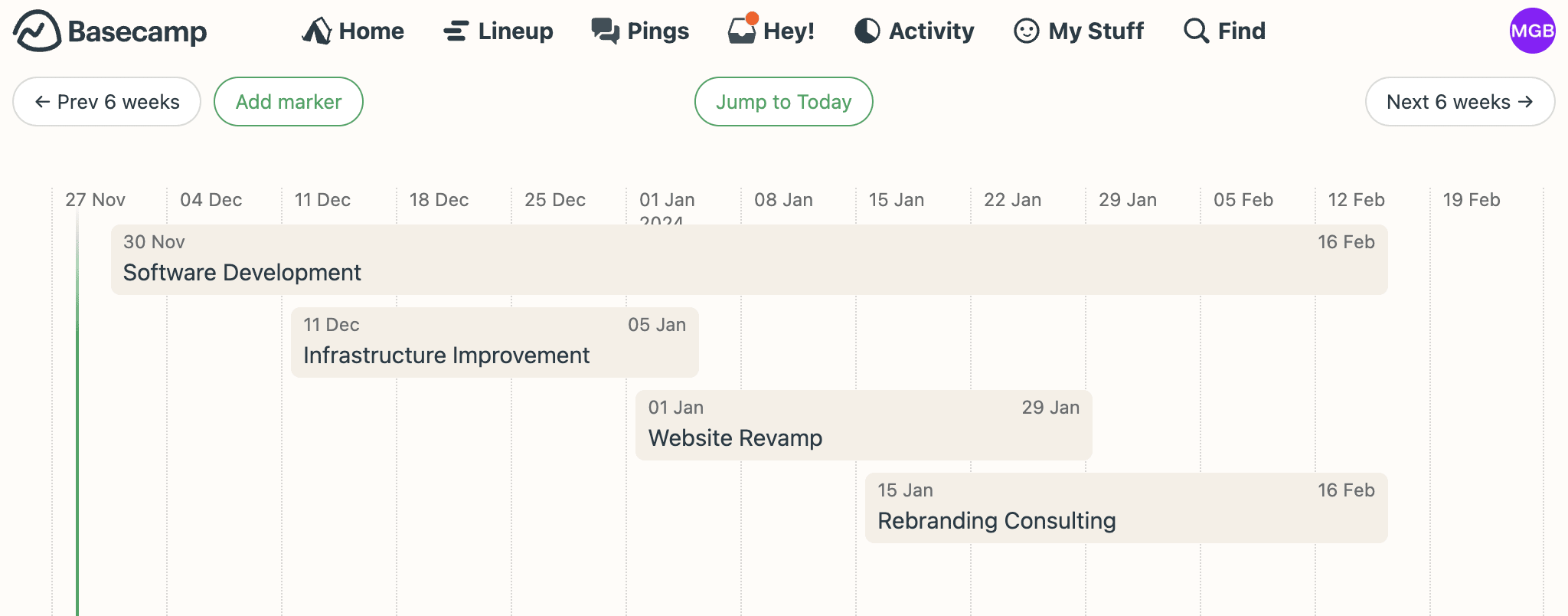
Basecamp top features
- Hill charts: Basecamp uses unique hill charts to give you an overview of project progress.
- Automated check-ins: Create routine reminders for team members to provide project updates.
- File storage: Keep project documents and assets organized in the same place you manage projects.
Pros:
- Basecamp is configured for communication with message boards and more.
- This software works well for small to medium-sized teams.
Cons:
- There aren’t specific features for invoicing.
- Some users said it’s difficult to tag tasks with priority level or other attributes.
Pricing: $15/user/month with annual plan. Free plan unavailable. More info on Basecamp pricing here.
Comparison: explore these Basecamp alternatives
8. Clickup
ClickUp is a cloud based collaboration and project management platform designed to streamline team workflows. It offers a wide range of features such as custom statuses, time tracking, and reporting.

Clickup top features
Multitask toolbar: The multitask toolbar allows users to edit multiple tasks simultaneously, saving time and effort.
Custom fields: ClickUp’s custom fields enable it to tailor the platform to your specific workflow, making it more efficient and effective.
Mind Maps: ClickUp’s mind maps feature enables users to visually map out their ideas and workflows, making it easy to see how tasks relate to one another and streamline the project planning process.
Pros:
- Agile project management: ClickUp’s agile project management tools help users keep track of team’s progress and adjust workflow as needed.
- Goals: Users can set, track, and measure progress towards their objectives, ensuring that everyone is aligned and working towards the same goals.
Cons:
- Inefficient comment’s threads: Comment’s threads and replays at chat space are hard to follow, they show entangled or not easy to find at a glance.
- Non-responsive dashboard:While dashboards are very nice, they are extremely slow to update and refresh.
Pricing: Free version is available for personal usage with limited features and paid plan starts from $7 per member per month
Comparison: explore these ClickUp alternatives
9. Zoho Projects
Zoho Projects is a cloud based project management software that helps organizations manage their resources. It comes with tools for task management, reporting, and issue tracking.
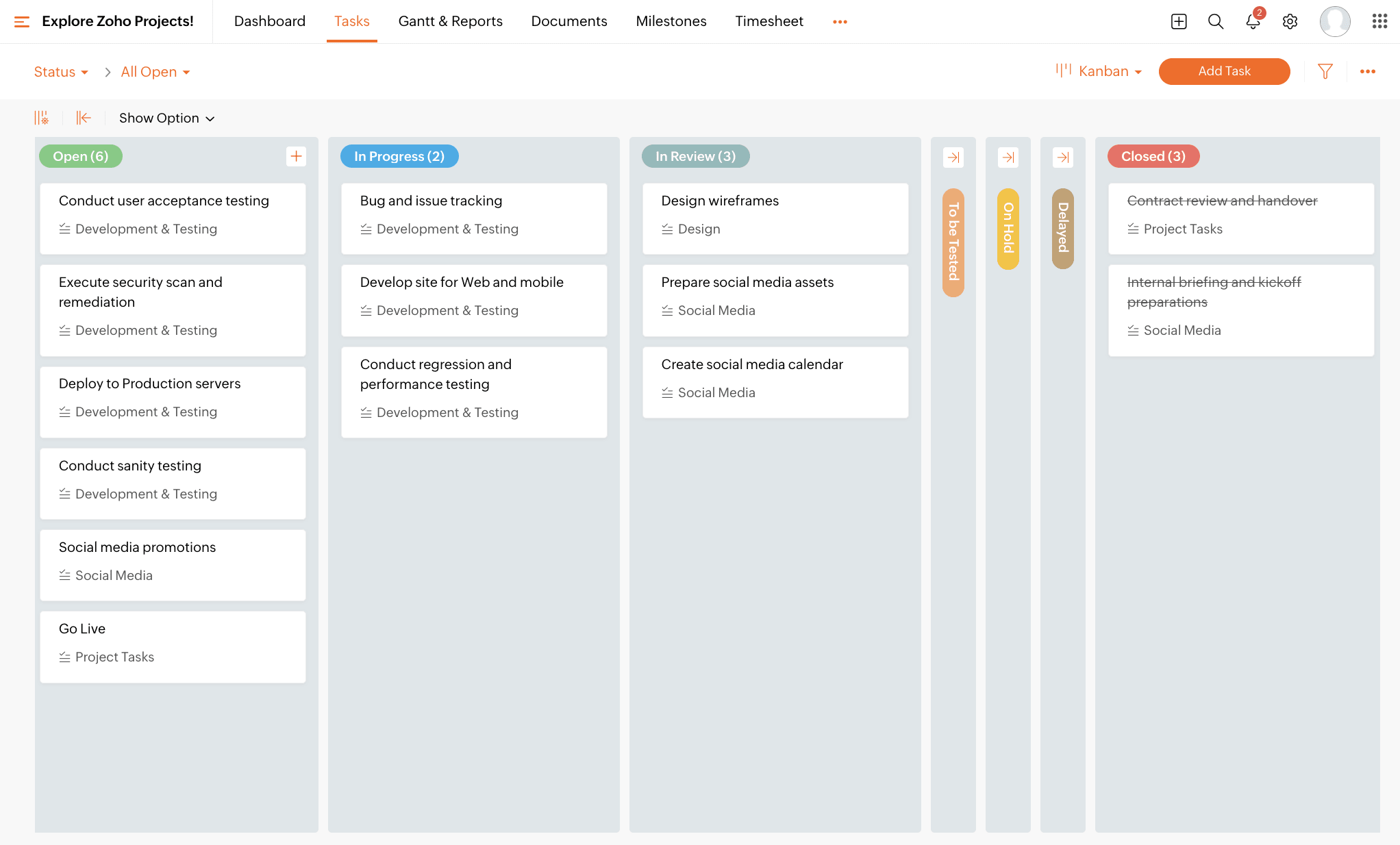
Zoho projects top features
Blueprint: Zoho Projects’ Blueprint feature allows users to create project templates, making it easier to launch new projects with predefined workflows.
Risk management: The Risk Management feature helps users identify and manage potential project risks, minimizing the chance of project delays or failures.
Custom fields: With custom fields, users can track and report unique project metrics specific to their needs
Pros:
- Comprehensive analysis: Comes with a suite of reporting tools to gain insights into project performance and make data-driven decisions.
- Workflows: You can automate routine tasks and processes, allowing teams to focus on high-value workflows.
Cons:
- Limited integrations: Zoho’s integrations for leave management system and attendance are very limited.
- Document storage: The software’s document storage function isn’t compatible for every file type.
Pricing: $4/user/month with annual plan. Free plan available.
10. Nifty
Nifty Project Management is an online project management tool designed to improve team collaboration and project efficiency.
Nifty top features
- Task management: Team members can create, assign, and track tasks, set deadlines, and receive notifications.
- Time tracking: A built-in time tracking feature helps team members track their time spent on specific tasks.
- Project roadmaps: Plot milestones and deadlines.
Pros:
- Project portfolio management: Nifty lets you create folders for projects into portfolios based on operations, account ownership, client delivery, and more.
- Time tracking: The built-in time tracking feature helps teams keep track of their work hours and make more accurate estimates for future projects.
Cons:
- Limited customization: Nifty’s customization options are limited compared to other project management tools.
- Lack of advanced features: Nifty may not have some of the advanced features that larger teams or more complex projects may require.
Pricing: $3.90/user/month with annual plan. Free plan available.
11. Todoist
Todoist is a web-based project management and productivity platform designed to schedule and plan daily routine tasks. It lets users collect tasks, organize projects and plan their day.

Todoist top features
Natural language input: Todoist allows users to add tasks quickly and easily using natural language, without the need for complicated forms or menus.
Smart schedule: Todoist’s smart schedule feature suggests the best date and time to schedule tasks based on their due dates, priorities, and other factors.
Customization: Todoist offers a range of customization options, including themes, filters, and labels, allowing users to personalize their task management experience.
Pros:
- Remote access: Todoist is available on multiple platforms, including web, mobile, and desktop, making it easy to access and manage tasks from anywhere.
- Reminders:Reminders feature sends notifications to users when a task is due or approaching its due date.
Cons:
- Complexity:Some users may find Todoist’s interface and features overwhelming, especially if they are new to task management apps.
- No-offline access: Todoist requires an internet connection, which could be problematic for users who need offline access.
Pricing: $4/user/month with annual plan. Free plan available.
12. Miro
Miro is a powerful project management and collaboration tool that helps teams work more efficiently and effectively. With its user-friendly interface and comprehensive features, Miro allows teams to plan, execute, and deliver projects.
Miro features
Visual collaboration: Users can create boards, add sticky notes, and invite team members to work together from anywhere in the world.
Integrations: Miro integrates with a variety of popular tools like Trello, Slack, and Google Drive.
Templates: Miro provides a library of templates for different types of projects, including product roadmaps, user story maps, and agile boards.
Pros:
- Customizable: Miro can be customized to fit the specific needs of a team or project.
- Real-time collaboration: Miro’s mobile app allows teams to work together in real-time, no matter where they are located.
Cons:
- Miro can be expensive for smaller teams and individual users.
- There can be a learning curve for some users, especially those who are not familiar with visual collaboration tools.
Pricing: $8/user/month with annual plan. Free plan available.
13. Hive
Hive is a productivity platform designed for teams to collaborate and streamline their workflow. It offers real-time communication, task management, and analytics to ensure teams stay on track and meet their goals.
Hive top features
Action templates: Allows users to create and automate tasks, saving time and increasing efficiency.
Forms: Users can create custom forms to collect data and feedback from team members and stakeholders.
External actions: There is an option to integrate with external tools like Dropbox, Google Drive, and Salesforce.
Pros:
- Customizable workspace: Users can personalize their workspace to fit their needs and preferences.
- Robust analytics: Provides detailed insights into team performance and project progress.
Cons:
- Limited integrations: Compared to other project management tools, Hive has a limited number of integrations available.
- Limited mobile app functionality: The mobile app lacks some of the features available on the desktop version.
Pricing: $5/user/month with annual plan. Free plan available.
14. Notion
Notion is a web based productivity and note-taking app comprising several organizational tools such as task management, to-do lists, project tracking and bookmarking.

Notion top features
Embeddable content: Notion allows users to embed various types of content such as Google Docs, Trello boards, and more, enhancing collaboration and accessibility.
Relational databases: With Notion’s relational database feature, users can connect different types of data across multiple pages and databases, making it easier to track information and analyze data.
Customizable templates: Notion provides a vast selection of customizable templates.
Pros:
- Powerful integrations: Notion integrates with Trello, Slack, and Google Drive, and more.
- Offline access: Notion allows users to work offline, ensuring that they can stay productive even when they don’t have an internet connection.
Cons:
- Steep learning curve: Notion’s powerful features can take some time to fully understand and master, which may be a barrier to entry for some users.
- Multi-project management: Some users have reported that managing multi-projects on Notion is a very tedious process.
Pricing: $8/user/month with annual plan. Free plan available.
Comparison: Explore these Notion alternatives
15. Airtable
Airtable is a web-based low-code productivity platform to build collaborative apps. It’s designed for custom workflow creation, collaboration, and communication on shared development projects.

Airtable top features
Custom extensions: With its Blocks SDK, users can create their own integrations, visualizations, and internal tools.
Linked records: Airtable’s Linked Records feature enables users to connect records from multiple tables within a single base, creating complex relational databases that are easy to manage.
Automations: With Airtable’s Automations, users can automate repetitive tasks and workflows without the need for complex coding or integration.
Pros:
- Real-time data accessibility: Airtable functions like a relational database where teams can see centralized data as it changes or gets updated in real-time.
- Intuitive apps builder: Airtable’s no-code/low-code architecture allows users to build the tools that meet their needs.
Cons:
- Limited reporting: Airtable’s reporting capabilities are limited compared to more advanced database software.
- Limited exporting options: Airtable’s exporting options are limited compared to more advanced database software.
Pricing: $20/user/month with annual plan. Free plan available.
Comparison: Explore these Airtable alternatives
Choose the project management platform that will best fit your business
Well, that was a lot of information, wasn’t it? We’re here to help you make some sense of it all.
As more teams work remotely and more businesses see the value of an organized work environment, it’s so important that your business identifies which platform is right for you.
Do you want something focused on time and task management? Or something more complete (like monday.com) — a customizable, open platform that makes work…work.
FAQ
What is project management software?
Project management software includes all the platforms and tools that help managers and teams plan, coordinate, and execute every aspect of project planning.
In short, it is made up of tools and apps designed to help you work more efficiently.
There’s an incredibly wide variety of project management software— from personal to-do lists to comprehensive “all-in-one” solutions —that facilitates the production of work for businesses of any shape and size.
What are the benefits of using software for project management?
Most successful organizations, teams, and individuals rely on software for project management because it offers many undeniable key benefits:
- Enhanced productivity
- Centralized file and data access
- Simple task management
- Transparency between team members
- Real-time goal setting and progress tracking
- Accurate resource management
- Better collaboration and communication
What features should a good project management software include?
No matter team-size, we found that a good project management software should serve as an all-in-one tool and provides the following:
1. Portfolio management view so teams can stay on top of everything
2. Automations to automate aspects of team processes and get time back for the more important things
3. Dashboards to share valuable insight
 Get started
Get started 
